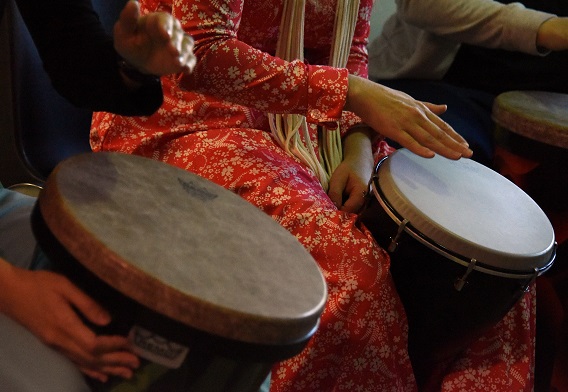
Late in 2020, after a harrowing year of COVID, I led several groups of hospital chaplains in a self-care group drumming activity. This was a group of frontline workers who, while not strictly in the medical profession, worked day in and day out comforting patients and loved ones during a particularly scary time in the pandemic – pre-vaccine.
Then, in the spring of 2021, we were feeling a bit more hopeful as the vaccine became widely available for adults in the U.S. I led an evidence-based group drumming workshop for two teams of Emergency Department doctors, nurses, and staff members. The atmosphere was more relaxed, but I could see the stress and burnout of the past year written on everyone’s faces.
And recently, I led a virtual drumming and wellness session for a local healthcare organization’s Adaptive Sports and Recreation support group. Virtual programs are old hat now and the group’s rapport was so strong that I felt I fit right in. I applauded them for showing up for each other and themselves.
What did these three groups have in common? They came together – to support each other, live in each other’s experiences, and take care of themselves. And they believed in the clinically proven ability of rhythm to provide them with real health benefits.
So, I’ve rounded up a list – a curated list of clinical studies highlighting the various physical, mental, and emotional benefits of drumming as a group. I invite you to use this list in a few ways:
- For your own education – to see how adding rhythm to your life can enhance your health
- For your organization – to highlight the importance of group rhythm programs for employee wellness initiatives
- For your community – to start a regular drum circle in your community for bonding and stress reduction
Drumming to improve health outcomes in cancer care
My colleague, percussion and professor John R. Beck at Wake Forest University, conducted a 4-week study in 2021 with a hospital oncology department for patients receiving treatment.
The numbers don’t lie; the drumming program improved patients’ mood and relaxation state and decreased pain: “100% of participants reported that the drumming sessions increased their satisfaction with their hospital stay. Patient energy improved in 81% of the sessions, mood improved in 88%, relaxation increased in 84%, and 49% of the sessions resulted in decrease in pain. Patients’ distress decreased in 63%, and anxiety decreased in 68% of the sessions.”
Read more here.
Drumming to increase social resilience among mental health service users
A 10-week group drumming study conducted among mental health services users in 2016 showed that “group drumming could improve depression, anxiety and social resilience among service users compared with a non-music control group.”
By week 6, participants reported decreases in depression and increases in social resilience, with further improvements in week 10, along with significant improvements in anxiety.
Read more here.
Drumming to improve social-emotional behavior among low-income children
In 2011, the Los Angeles Unified School District (LAUSD) conducted a study of 101 5th-grade students on the effects of drumming on social-emotional behavior. The 12-week counselor-led program focused on social-emotional problems linked to chronic stress that are often found in low-income youth populations.
The study found that “participation in group drumming led to significant improvements in multiple domains of social-emotional behavior. This sustainable intervention can foster positive youth development and increase student-counselor interaction. These findings underscore the potential value of the arts as a therapeutic tool.”
Read more here.
Seminal studies in immune response, stress response, bonding, and more
Lastly, the Remo percussion company conducted a series of clinical studies in the early 2000s that focused on specific outcomes in a variety of populations. From this data, they were able to develop and hone their evidence-based HealthRHYTHMS(R) protocol, which is utilized in environments from classrooms to boardrooms around the globe.
Remo conducted studies on improving immune response in older adults, reducing anxiety and depression in mental health service users, reversing stress on a DNA level, and more.
Read all study abstracts here.
A parting note
Reading study abstracts can be daunting, especially if your background isn’t an academic one. Just Add Rhythm’s goal is to provide opportunities for you to experience the benefits of group rhythm firsthand. We want to empower you to learn how to use rhythm to reduce your stress or anxiety, lower your blood pressure, make more meaningful connections, and rediscover your inner child.
Reach out to us to learn how we can bring rhythm to your organization or community. You’ll love finding your beat!







